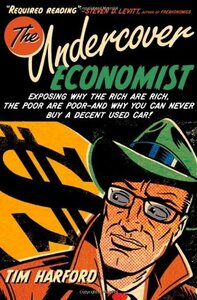You need to sign in or sign up before continuing.
Take a photo of a barcode or cover
This book reminded me a lot of Freakonomics. Very interesting concepts to think about, but nothing to take as gospel.
Like Freakonomics but with a little more meat to it. I really liked that there were terms and concepts I remembered from my Econ classes, but they were presented in interesting ways. The latter chapters got a little too stocks/insurance/finance focused for me but were still demonstrated in useful and simple ways.
funny
informative
medium-paced
Brillaint, had to read twice to understand some of the economic principles here. Must READ!
Worth reading, to get an idea of why the U.S. still has a heavily market-based economy, despite so many messages that this is bad. Bc 95% of the experts, the economists, from liberal to conservative, are in favor of free markets and free trade. This guy has political views that reflect lots of people, but is more careful about the unintended but easily anticipated consequences of enacting economic legislation.
fun read and informative, i had to read this for a basic economics course.
Quite a good little intro. I read enough economics texts and blogs (note to self: add Tim Harford's blog to my already bulging list of RSS feeds) that I didn't find anything too surprising. Nevertheless, the overall presentation is well done for a popular overview, and served as a good review. As an aside, the constant coffee-talk reminded me of [a:Peter Navarro|57585|Peter Navarro|http://www.goodreads.com/assets/nophoto/nophoto-U-50x66-251a730d696018971ef4a443cdeaae05.jpg]'s stock trading treatise [b:If It's Raining in Brazil Buy Starbucks|99892|If It's Raining in Brazil, Buy Starbucks|Peter Navarro|http://d.gr-assets.com/books/1347908850s/99892.jpg|96305].
The only point of cognitive dissonance I had was that, having been published in 2005, this book feels a little dated even now. Obviously, it doesn't mention anything about the 2007/2008 financial crisis, and I expect if it were written now, more attention might be paid to health care, campaign finance, etc. That doesn't take away from what's there — it just means that perhaps there's a good opportunity for a revised edition! :) (Or, perhaps Harford has addressed these in his other books.)
The only point of cognitive dissonance I had was that, having been published in 2005, this book feels a little dated even now. Obviously, it doesn't mention anything about the 2007/2008 financial crisis, and I expect if it were written now, more attention might be paid to health care, campaign finance, etc. That doesn't take away from what's there — it just means that perhaps there's a good opportunity for a revised edition! :) (Or, perhaps Harford has addressed these in his other books.)
I got about a third of the way through then a friend that was visiting asked to borrow it as he flicked through and found it interesting. I love lending out books and encouraging people to read, especially people who don't usually read a lot so I saw my opportunity and I took it! I'll either finish it once it's returned or pick up another copy in the future.
informative
medium-paced
My understanding of economics is not that great. Definitely this book touches upon more ideas that were new to me. Easy read fr me. I liked the narrations of Starbucks and China's march towards prosperity. The story of why Cameroon is poor reminded of Masala Movies of India.

